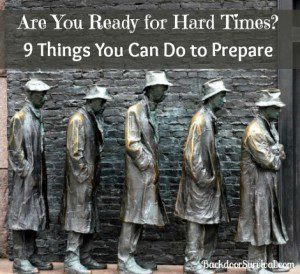By Gaye Levy
Contributing Writer for Wake Up World
Most Prepper types that I know appear to have a common trait: they are good at evaluating risks then moving to mitigate those risks in a nimble manner. What that means, in somewhat plainer English, is they have the ability to evaluate a situations, make a plan, learn from it, and ultimately act in a responsible manner.
Along those lines, more recently I have done some personal analysis and put more focus on what I call “hard times ahead”. With my disaster preps more or less in order, I want to ensure that my own household will get through a period of difficulty when, for instance, there is not enough food, work, or money to go around.
A couple of years I shared 7 Tips to Prepare for Hard Times. Today, with even more concern about an eminent financial collapse, I suggest 9 more tips to prepare for hard times ahead.
1. Accumulate cash and store it under your mattress, preferably in small denominations
No silly, I don’t really mean that you should store cash under your mattress (so do not come over and look under mine!). Rather, you will want to store cash is some well-hidden place or places where you can get to it in secret, if needed. Although I have not done so yet, I plan to locate a cache of bills underground in two or three different locations.
Now that I think about it, burying a supply of heirloom seeds, well sealed in Mylar bags, might be a good idea as well.
2. Maintain a survival library and a survival notebook
The time may come when your online resources may no longer be available. Perhaps, as mentioned above, the grid may be down. Or perhaps the internet will be censored with survival and preparedness sites blocked. It could happen, you know.
Accumulate some preparedness books in print form and maintain your own survival notebook in a three ring binder. Don’t overlook free resources that may be available from your local county or state emergency management department.
3. Practice haggling and the art of barter for goods and services
A good place to start is at flea markets or thrift shops. In my big-city days I have even tried this in boutiques but I never did have enough nerve to do so while shopping for shoes at Nordstrom.
For many, this will take you outside of your comfort zone so start modestly and work your way up toward more sophisticated barter transactions.
See: 101 Low Cost Items to Barter When the SHTF
4. Take care of major or minor health concerns now
Get your teeth cleaned and take care of any dental work that needs to be done. If there is a medical procedure you have been putting off, do so now. Are you overweight and in poor physical shape? Cut out sweets for awhile and start walking to build your stamina.
5. Make learning a habit
Set aside a brief period each week to either learn a new skill or practice becoming more proficient at a skill you already possess. Better yet, take some time – even a few minutes – each day to find a new trick or tip to add to your survival notebook.
Amazon frequently offers free e-books on a variety of topics. These books are typically only available for one to five days and are a great way to learn something new. Sure, they may not be available if the power is out but if the goal is to learn from them, take notes and put what you learn into action now rather than later.
One of the most important things you can do now to prepare for a crisis or disaster is to always be learning. Side note: On most days I post a link of two to relevant free e-book over on my Facebook page.
6. Take care of home repairs that have been on the deferred maintenance list forever
This one is near and dear. My home was built in 2006 so it is fairly new. On the other hand, it is getting to the point where walls need to be touched up, boards on the porch need to be nailed down, plumbing fixtures need to be checked for leaks, and a lot more.
All of those little things around the house that have been put off may be an mere annoyance now, but down the road? Anything and everything in disrepair can and will come back to haunt you.
7. Learn to cook bulk foods from food storage
 In a recent comment, a Backdoor Survival reader took issue with the “store what you eat” mantra of food storage. And in a way she was right but with this twist.
In a recent comment, a Backdoor Survival reader took issue with the “store what you eat” mantra of food storage. And in a way she was right but with this twist.
Without question, beans, rice, oats, wheat and the like are going to be the cheapest food storage items out there. Rather than shun them because you don’t eat them now, learn to prepare them in such a way that they become palatable to your family. For very little money, you can store a year’s worth of bulk foods. Perhaps they will not be as tasty as a juicy hamburger, but you will not starve.
I suggest you start with the ubiquitous pinto bean: Respect for the Lowly Pinto Bean
8. Make arrangements for alternate living quarters just in case
This is a two way street. If something should happen and you could not live in your home, where would you go? It would be nice to have a reciprocal arrangement with family or friends, even if they are not preppers.
Speaking for myself, I have set up such an arrangement with friends and likewise, have prepared my small home with those things that will be needed in the event my non-Prepper brother and his family needs a place to stay.
9. Learn to become self-entertaining without spending money
Like an old broken record that has a repeating skip, I am again telling you to become self-entertaining.
Learn to enjoy your free time without being dependent upon money, cable-TV, or trips to the shopping mall. Read, ride a bicycle, play cards or board games, dance or go for a hike. There are are way more pursuits to keep you occupied than I can list here, and yet it amazes me how many people can not stand to be by themselves.
The Final Word
As cliché as it may sound, prepping IS overwhelming. Likewise, it is a lifestyle choice that will provide insurance against disruptive and possibly catastrophic events. I find it interesting that whereas the US government promotes preparedness, they tout economic recovery rather than prepping for hard times.
Let us take control of our future and prepare for hard times. They may, or may not occur, but at least we will be ready.
Enjoy your next adventure through common sense and thoughtful preparation!
Gaye
Further articles by Gaye Levy:
- Using Nature’s Remedies for Health and Wellness
- 20 All Purpose Remedies Using Essential Oils
- The Powerful Healing Qualities of Rosemary Essential Oil
- 15 Alternative Uses for Honey
- Vermiculture: How To Build A Worm Bin the Cheap and Easy Way
- Spices for the Survival Pantry
- 21 Home Remedies for a Toothache Emergency
- The Miracle of Tea Tree Oil: 80 Amazing Uses for Survival
- 26 Five-Minute Prepping Projects
- 10 Simple Steps Toward Self-Sufficiency
- Creating a Healing Garden: 9 Healing Herbs You Can Grow Yourself
About the author:
 Gaye Levy, also known as the Survival Woman, grew up and attended school in the Greater Seattle area. After spending many years as an executive in the software industry, she started a specialized accounting practice offering contract CFO work to emerging high tech and service industries. She has now abandoned city life and has moved to a serenely beautiful rural area on an island in NW Washington State.
Gaye Levy, also known as the Survival Woman, grew up and attended school in the Greater Seattle area. After spending many years as an executive in the software industry, she started a specialized accounting practice offering contract CFO work to emerging high tech and service industries. She has now abandoned city life and has moved to a serenely beautiful rural area on an island in NW Washington State.
Gaye lives and teaches the principles of a sustainable and self-reliant lifestyle through her website at BackdoorSurvival.com. At Backdoor Survival, she speaks her mind and delivers her message of prepping with optimism and grace, regardless of the uncertain times and mayhem swirling around us. You can find Gaye through her website Backdoor Survival.com, plus Facebook, Twitter and Pinterest.
If you have not done so already, please be sure to like Gaye’s ‘Survival Woman’ Facebook page, which is updated every time there is a new article, news byte, or free giveaway. In addition, when you sign up to receive Gaye’s email updates you will receive a free, downloadable copy of her e-book The Emergency Food Buyer’s Guide.

If you've ever found value in our articles, we'd greatly appreciate your support by purchasing Mindful Meditation Techniques for Kids - A Practical Guide for Adults to Empower Kids with the Gift of Inner Peace and Resilience for Life.
In the spirit of mindfulness, we encourage you to choose the paperback version. Delve into its pages away from screen glare and notifications, allowing yourself to fully immerse in the transformative practices within. The physical book enriches the learning process and serves as a tangible commitment to mindfulness, easily shared among family and friends.
Over the past few years, Wake Up World has faced significant online censorship, impacting our financial ability to stay online. Instead of soliciting donations, we're exploring win-win solutions with our readers to remain financially viable. Moving into book publishing, we hope to secure ongoing funds to continue our mission. With over 8,500 articles published in the past 13 years, we are committed to keeping our content free and accessible to everyone, without resorting to a paywall.



